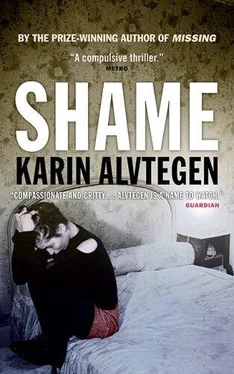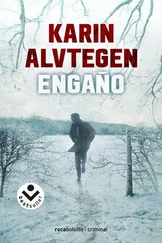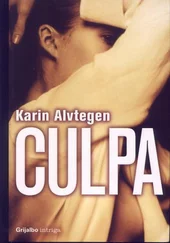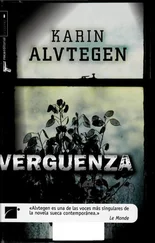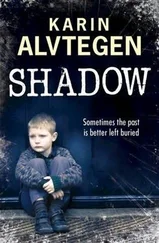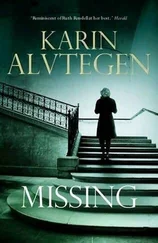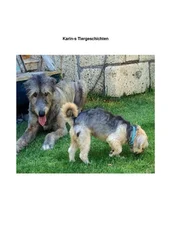Because there were many types of prison. And for that matter, a person who was imprisoned never needed to have come anywhere near a court of law.
There was a letter from Maj-Britt lying in the hall. With deepest regrets she had begged forgiveness for what she had put Monika through, and wrote that she had tried to call repeatedly to take back what she had said. But Monika never answered. She read the letter over and over. First in anger, but later with more and more sorrow. In vain she had tried to find scapegoats in order to create a way to exonerate herself, but in the end she was forced to admit that there was no one else to blame.
A few days before the trial, a letter came from Pernilla. Monika hadn’t been in touch, and in her desperation she had refused to answer phone messages, and finally they had stopped coming. The letter was a sign that Pernilla had found out, and the return address frightened her like a sudden noise in the night. Fingers stiff with dread, she had opened the envelope, and the relief she felt when she read the brief letter was indescribable. She had been forgiven. Pernilla had found out everything, and she admitted that at first she had been both angry and sad. But the person who told her had in the end made her understand why Monika had acted the way she had done, and managed to turn her rage to sympathy. But Pernilla wondered about the money she had received. Had Monika been reported to the police because of the money she gave Pernilla? Or was it because of the money she was forced to send to Save the Children?
Only then did Monika understand that it was Maj-Britt who had liberated her.
* * *
The sun crept over the rooftops and spread millions of tiny sparkling diamonds in the newly fallen snow. Monika wrapped her jacket tighter around her, but it didn’t help much. She saw by the clock that she had spent only half of the hour she was permitted to be outdoors, but no amount of cold in the world could make her go in early.
Out of the corner of her eye she saw a door open and someone come out into the courtyard. She didn’t look, she didn’t dare, she had no idea what rules applied in here for survival. The annihilating feeling of being an outsider and the loneliness she experienced in the midst of all the people at yesterday’s evening meal had made her so anxious that she asked to be allowed to go back to her cell early. But it was when they locked the door that she experienced for the first time in her life how it felt not to be able to breathe in a room full of air. She had thought she would die in there. But the only people she could ask for help were the ones who had locked her in, and the torment they were subjecting her to was no careless mistake but a deliberate act. They thought she deserved it.
The impotence she felt had almost killed her.
She sensed that the person who had come outside was approaching, and in a purely defensive reaction she turned her head to get some idea of the possible threat. It was one of the oldest women in the prison; Monika had seen her the day before at dinner. She sat by herself and looked as if nothing that happened in her vicinity actually affected her, and the others in the room seemed to respect her solitude. At first the sight of the woman had made Monika uncomfortable, because of the look in the woman’s eyes when they met. As if she were startled, as if she had caught sight of someone she knew. But Monika had never seen the woman before and didn’t want to draw attention to herself. That was the way she had planned to get through her time here. By not being noticed.
Now the woman was approaching the bench, and Monika could feel her heart pounding. She remembered the chatter during dinner, the obvious hierarchy, the sense that everyone was acting according to an invisible script in which she had been given no role. And for the life of her she didn’t know how she would find her place without getting on the wrong side of someone. She had absolutely no frame of reference as to how she was expected to behave. And yet this was a different type of fear than she had been used to. Inside there was nothing left to harm. Instead it was her body that feared physical pain. That they might assault her.
‘Won’t you get a bladder infection from sitting there?’
In her gratitude over knowing the answer to the question, Monika’s first impulse was to say that it took a bacterium in the urine to provoke a bladder infection, but she bit her tongue to stop herself. It would seem as if she was acting superior.
‘Maybe.’
She stood up.
The woman caught a silver-coloured wisp of hair that had come loose and tucked it behind her ear.
‘Shall we take a walk?’
Monika hesitated. The woman didn’t look particularly dangerous, but to stroll farther away from the buildings alone with her was not appealing. She cast a hasty glance at the door. But she didn’t want to go inside yet. Not when there was time left. And she couldn’t really say no and stay where she was.
‘Sure.’
They began walking slowly across the courtyard. There was no reason to hurry.
‘You got here yesterday, right?’
‘Yes.’
‘How much time did you get?’
‘Six months.’
Monika replied politely and quickly to all her questions. So far she was doing fine.
‘That’s not so bad. The time goes faster than you think when you’re bored.’
The woman gave a little laugh and Monika also smiled, to be on the safe side. She realised that she ought to ask a question to show that she was participating in the conversation. Maybe ask how long this woman had been in, but Monika didn’t dare. Maybe it wasn’t done.
‘Sixteen and a half years.’
Monika gave a start.
‘But I only have eight months left now.’
She only had a second to be shocked, then she unconsciously slowed her pace. Sixteen and a half years. Not many were given such a long sentence. Only those who had committed really despicable crimes, and apparently the woman she had gone off walking with was one of them. Monika cast a glance back towards the buildings and felt a stubborn desire to go back. She stifled the impulse and tried instead to think up a question of her own. She had to get along with people in here for another six months, after all. It would be crazy to make an enemy on the very first morning.
‘What are you going to do when you get out?’
She had done her best to seem easy-going and took a step back in fright when the woman suddenly stopped and turned to her.
‘My name is Vanja, by the way.’
She held out her hand.
‘It’s easy to forget common good manners in here.’
Monika took off her mitten and shook her hand briefly.
‘Monika.’
Vanja nodded and started walking again. Monika
followed her reluctantly. A little farther up there was a group of people, and that made her feel a bit better.
‘What I’m going to do when I get out? I don’t really know. To start with I’m going to move in with a friend, an old childhood friend. She’s very ill but after this last operation she seems to be on the mend, thank goodness, but they don’t know for sure yet. If all goes well maybe we’ll take a trip together somewhere, she and I. We’ll have to see how things go.’
Monika tried to grasp the time concept of seventeen years. An eternity if you considered that the sentence had to be served in a place like this. Much less serious matters could drive people insane. She knew that from her own experience.
They had turned onto a path between some trees, and when they came out on the other side the open field sloped down towards the end of the world. Soon they would reach the limit of how far they could go. The area was fenced off by a double barrier with several metres between them, and rolls of barbed wire had been attached on top. So that anyone who might consider climbing over them would be ripped to shreds. It was in here that she was confined. Not trusted by society to go outside. Not even in the vicinity, because the safety zone was fifty metres. She cast a glance over her shoulder and made sure that there were still people within sight.
Читать дальше
